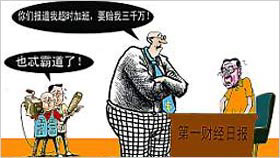|
 A Taiwan-funded company has slashed
its defamation claim against two Shanghai journalists from
30 million yuan (3.75 million U.S. dollars) to just one yuan (13
U.S. cents). A Taiwan-funded company has slashed
its defamation claim against two Shanghai journalists from
30 million yuan (3.75 million U.S. dollars) to just one yuan (13
U.S. cents).
An official at Hongfujin Precision Industry
Co., a wholly-owned subsidiary of Taiwan's Foxconn that manufactures iPods
for the U.S.-based Apple Inc, told Xinhua in a telephone call that the
company would apply the Shenzhen Intermediate Court to unfreeze the journalists' assets, which
include their homes, bank accounts and a car.
The official also said the company would add the China Business News,
employer of the two journalists, to the list of defendants.
Weng Bao, a reporter involved in the case, also confirmed the news.
"This is the victory of Chinese media," he said.
The company has filed a defamation suit against Weng and his colleague
Wang You over a report alleging most of its workers had to work stand up
12 hours a day and some fainted with fatigue.
The decision followed several days of public debate during which the
two journalists set up their own webblogs to express their grievance. Nearly two million people had
visited the blogs by the middle of Wednesday, mostly voicing support for
the journalists.
An on-line poll of 43,250 people launched by www.sina.com.cn showed on
early Thursday that 48.1 percent of respondents believed that Hongfujin
would lose the case, 41.22 percent argued that the company and journalists
would reach an agreement, 5.81 believed the company would win and the
remaining 4.87 were undecided.
The survey also showed 83.22 percent of the respondents believed the
two journalists did not damage the reputation of the company.
However, a reader calling himself Fanhui, the Chinese for "Objection",
said, "the news report is a little bit sensational. They should
investigate the case thoroughly."
Apple Computer said Wednesday it was trying to settle a dispute over
alleged labor abuses at its iPod factory in China, an awkward case
highlighting the challenges big companies face in living up to their codes of conduct while
outsourcing most of their
production, AP reported.
The case also reflects the pressures Chinese journalists confront in
doing their jobs.
(Agencies) |